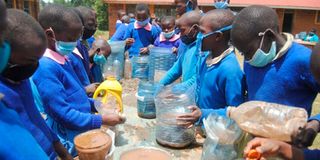CBC can reform teaching, exams, reduce cheating

Grade Three pupils at Turi Sulgwita Primary School in Molo Sub-County, Nakuru County during a practical lesson of filtration.
What you need to know:
- There is a need for careful thought on the CBC learning activities.
- Just how will they promote the hallmarks of innovation and sound decision-making espoused in CBC?
Recent stories of examination cheating continue to indict the nature of our education system. Whereas we may find consolation in the fact that the country is phasing out the old exam-oriented 8-4-4 system, we may as well want to inquire into tutors’ preparedness, more so in terms of mindset and capability, to adapt to the new Competency-Based Curriculum (CBC) being rolled out.
I’ve heard arguments that our summative exams do not test the actual capability of our students. If so, what do they test? You can’t measure what’s not there; they measure something — what has been taught — which we should actually be questioning.
So, just what do we teach? Are the experiences capable of producing the person, citizen or worker that we desire? How did we arrive at a situation characterised by unprofessionalism, incompetence, inhumanity and lack of integrity and patriotism?
CBC is emphatic on competencies like critical thinking and problem-solving, imagination and creativity, digital literacy, communication and collaboration and citizenship. These are to be taught and examined through authentic tasks and situations.
You see children sweeping markets and trapping moles, among other outdoor activities. It’s more of what one can do and less of what they know.
There is a need for careful thought on the CBC learning activities. Just how will they promote the hallmarks of innovation and sound decision-making espoused in CBC? An exam cheat succeeds partly because of the kind of questions and activities set.
Problem-solving skills
For instance, I don’t know what to make of the recent activity where Grade Four pupils were asked to construct scarecrows. Whereas it’s not a bad idea (at least it teaches collaboration), the timing of the project was poor. Scarecrows worked ages ago, when predators such as monkeys were yet to evolve.
Don’t even think of how people will regard them; security guards are attacked in broad daylight! Instead of resorting to Stone Age activities, engage learners in creative ideas to solve today’s problems.
Now, problem-solving skills need not only be developed through hands-on activities. Mental ones equally matter — like having them explain how they can solve hypothetical problems — lest CBC is misconstrued to be only about vocational work.
All practice is informed by some theory, the latter presupposing both propositional and dispositional knowledge. And exams will be there to sieve the true from the untrue.
They need not only be local; we can often participate in international exams like those based on The Programme for International Student Assessment (PISA) conducted by OECD.
Offered in 65 countries globally, Pisa exams test critical thinking in mathematics, science and literacy, demanding students to draw on knowledge and real-world problem-solving skills.
Mr Osabwa is a lecturer at Alupe University College, Busia. [email protected].





